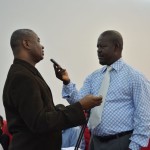Young People Provide Hope for a Bright Future in Angola

Carlos, SFCG Angola Program Coordinator, with conflict resolution community mediators from the students associations of Cacuaco.
By Simone Pissi
They call it casimbo, or “winter” in the local language, when referring to the everlasting haziness that blankets Angola’s capital city of Luanda all year round. It is immediately noticeable after stepping off the plane. Surprises, however, do not end at the airport. Three weeks into my arrival in Angola, I still look the perfect picture of amazement as we travel the country. Mouth agape, I find myself needing to snap photos as memories of the past quickly fade and mold with new extraordinary elements of Angolan life.
Having spent most of my life in different countries, three months in Angola did not seem so unsettling. And while in Italy, trying to piece together Angola’s social context and history and skimming quickly through the pages of an overpriced Lonely Planet Angolan guide in a library in Rome, I asked myself: How many years did it take to get a feel of the Emirates? How long did take to make sense ofmy surroundings in the United States, England or Tanzania? An idea was forming and I decided to leave the many questions about Angola unanswered before setting off.
Humbling is the first word that comes to mind if you ask me to summarize Angola thus far. The never ending music, incessant traffic, and the explosion of a young population have managed to render the 27 years of civil war and a hurried European decolonization almost a thing of the past. While the memories of the conflicts are still fresh among many adult Angolans, it is fascinating to see how these people, fueled by a relentless dynamism and “joie de vivre,” are continuing to make steps towards rebuilding their nation.
Whilst the country is undergoing a critical moment, SFCG Angola and its local partners have been implementing a number of projects across the many national provinces, ranging from media productions, to radio talk-shows, to civil society and community engagement, to youth conflict resolution centers and school parliaments focused on capacity strengthening. And while it only takes a few hours through the busy streets of Luanda to understand why the main focus of the reconstruction process and determination of Angola’s future is directed towards the young generation, the rebuilding processes will undoubtedly take much longer.

Students from a youth association when Simone was visiting a youth conflict resolution center being rehabilitated by SFCG.
The project has managed to set up a number of Youth Conflict Resolution Centers throughout the capital city. As part of the implementation team that carries out the focus group questionnaires for the evaluation of the project, I have been able to witness the positive results both from the students and, inevitably, from the project itself. Tasked with assessing the level of knowledge and know-how retained at the end of the training, I have noted that the students who were part of the workshops were able to actively participate and answer questions with relative ease.
What once was my initial perception of Angolan society is quickly becoming a pervasive belief. After the initial assessments of the Youth Conflict Resolution Centers, it has become clear to me that the driving force behind this country lies within its young population. Distracted by the call of western lifestyle and its sometimes secular beliefs, yet still anchored to strong social and religious values, they find the strength to strive towards a better life, a common ground between old and new.
With a controlled media and a general prevailing sense of unreachable aspirations amongst young Angolans, the challenge for the SFCG staff and its partners has been to increase the awareness and knowledge of democratic principles in order to prevent Angolan youth from easily falling prey to manipulation and to give an alternative to the messages carried by the mainstream ideology in Angola.
My first trip took me to the south of the country. A 14 hour drive that eventually lead to the beautiful town of Lubango where we were greeted by chilly temperatures! The journey was magnificent and Angola showed itself in all its beauty as we travelled and were able to observe the scenery change from desert to savannah to jungle and to high mountains throughout the duration of the trip. We also drove through several cities that have made the history of Angola: the very Portuguese cities of Benguela, Lobito, Porto-Amboim, Sumbe, and Cabo Ledo. Once in Lubango we were greeted by members a local partner association. I was delighted to see the level of enthusiasm and dedication shown by those young people as we exchanged opinions and ideas about the upcoming projects whilst planning for the mobile cinema screenings that will soon take place in this province
My return to the capital left me with additional questions and concerns but, after coming into contact with the determination of those willing to face these challenges, I remain confident that this country will overcome its adversities and lay the road to a prosperous future. I have no idea what the next turn will bring, but I find the prospect of the upcoming challenges very exciting.
Obrigado e Até logo! [Thank you and goodbye!]
Simone Pissi is currently interning with SFCG’s Luanda office in Angola. Holding a joint degree in Political Science and International Affairs from Link Campus University of Malta and Universita’ Federico II di Napoli, Simone will return to Italy after his internship to continue with his Master’s degree in Human Development and Food Security.











